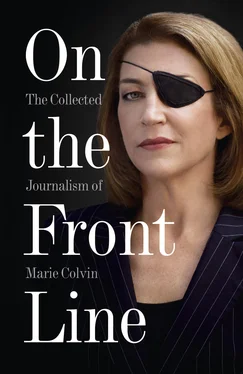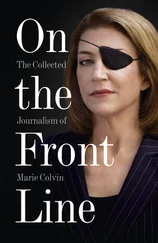Life was not all misery. Yahia had three villas, six luxury cars, all the money he wanted, beautiful women in droves. ‘But I was always afraid,’ he said. ‘I was afraid Uday would kill me. I was afraid of being killed instead of Uday. Nine times I suffered assassination attempts.’
The attempts to kill him were sometimes by family members outraged that Uday had dishonoured their women, sometimes by political opponents. Once, he recalled, an outraged man burst into Uday’s office at the Special Olympic Committee, which he headed, claiming he had raped his young daughter. The father said he had killed his daughter because of the dishonour and wanted satisfaction from Uday.
‘Uday pulled out his pistol and shot him on the spot,’ Yahia recalled. ‘I sat in his office, six metres away. I was not shocked. I had seen it before. I knew I could do nothing.’
Yahia described a permanent atmosphere of fear in the presidential palace. Even those closest to Saddam refrained from speaking openly; everyone was afraid that they would be reported as disloyal, and the penalty was death.
He said Qusay, Saddam’s younger son, who now heads the presidential intelligence agency, was the Iraqi president’s favourite and heir apparent. ‘Uday never called his father “dad”,’ Yahia said. ‘Even in private he addressed him as “your excellency”.’
One of the few people with whom Yahia could relax was Saddam’s double, Fawaz al-Emari. He was the second man trained to impersonate the Iraqi president; his predecessor was killed posing as Saddam in 1984.
Emari had undergone far more extensive surgery than Yahia. His face had been entirely remodelled in Yugoslavia, and Russian doctors in Baghdad had operated on his vocal cords so he would speak exactly like Saddam. ‘Sometimes when I met him, for a moment I would be afraid, thinking he was Saddam. And we were good friends,’ said Yahia.
He and Emari would practise target-shooting together in the palace grounds, which included a swimming pool, cinema, theatre, hospital and sports centre. ‘We spoke about general matters, but never about what we really felt or our activities. We were both too afraid one would betray the other,’ he said.
Both doubles had to undergo weekly medical examinations. Doctors at the presidential palace would check that they were still the same weight as their masters, that their health was good, and that their surgery work remained sufficient for impersonation.
Saddam’s double remains in the palace to this day, a virtual prisoner of his identity. ‘Fawaz had a much more difficult life than me,’ Yahia said. ‘At least Uday went out all the time to restaurants, parties and discos, so I could. Saddam never did these things so Fawaz never could. He could not even go outside and walk on a street looking like Saddam; he would have been killed. He was banned from ever leaving the palace except when he was working.’
Work meant big formal occasions, including a hugely publicised swim by ‘Saddam’ in the Tigris on 26 July 1992. The swim was staged to prove that the president was alive and in good spirits despite the devastation of the Gulf War. In fact, he was afraid to appear in public and exposed his double to danger instead.
Yahia made the decision to flee almost a year after the allies liberated Kuwait in February 1991. His relationship with Uday had become increasingly tense.
‘We were at a party at the Rasheed hotel,’ Yahia recalled. ‘Uday was invited by the president to receive four medals for his role in the Mother of all Battles. I joked, “You are not worth receiving these: I was in Kuwait instead of you.” Uday said there was no difference, but he was not happy with me.’
The danger sign came the next night at another party, when Uday’s ‘love-broker’, who procured girls for the president’s son, upbraided Yahia for refusing to sell him a car. Then Uday also turned on Yahia.
The master apparently sensed that his double was going to make a break for freedom and decided to stop him. As Yahia stepped from a lift into the lobby of the Babylon hotel in Baghdad the next morning, Uday suddenly appeared and shot him. The bullet hit him high in the chest, missing vital organs.
Bleeding heavily, he says, he managed to get to his car and drive north towards the UN-protected safe haven in Kurdistan. To his surprise, Iraqi guards had not been alerted. ‘At every checkpoint, nobody stopped me, they just waved me through. I would see them saluting in my (rear-view) mirror.’
Yahia has the scars to support his story: a round wound in the top of his right chest, an exit hole out the back. As he approached Kurdistan, he needed urgent medical treatment and feared the reception he would get from the Kurds. ‘I could not go directly to Kurdistan. If the Kurds saw me, they would think I was Uday and kill me. So I abandoned my car in the woods, and went to a friend’s house. I am from a Kurdish family, so they helped me.’
Through the Kurdish underground, he reached the American operations headquarters in the Kurdish town of Zakho. The Americans, wary at first, flew in four intelligence officers to debrief him. His wife, who had gone into hiding, was helped out by the same Kurdish underground, and their baby daughter was smuggled to Jordan by friends.
With the help of the Americans, he was granted political asylum in Vienna where many Iraqis live. But an import-export company he set up has failed to prosper and, because of Vienna’s close connections with Baghdad, the city has a high number of Iraqi government representatives. Any one of them, he fears, might be a potential assassin.
His anxiety heightened last September when he received a letter from the Iraqi embassy saying he had been granted an amnesty and should return to Baghdad. The message came on his personal fax machine, even though he is living in hiding and gives the number only to close personal friends.
Yahia is afraid to send his daughter, Tamara, now five, to school in case his whereabouts can be traced through her. He keeps his wife, daughter and Omar, their 18-month son, with him even at the office.
Most of all, he finds it difficult to recover any sense of himself. ‘Uday stole my life, my future, my identity,’ he said. His wife agrees. Watching videos of Yahia posing as Uday in Baghdad, she shivered when she saw the man on the screen roughly grab a tissue proffered by an aide.
‘He changed so much in his manners,’ she said. ‘Before, he was a normal person, but after he was tough and violent. He would hit me or kick me, and many times I thought of getting divorced. But I know now he is trying very hard to recover himself.’

Blood feud at the heart of darkness
8 September 1996
Terrible deaths in the family of Saddam Hussein illlustrate the brutality of a tyrant still powerful enough to shake the world. Marie Colvin reports from Oman.
In the glistening marble and gilt palace of Hashemiya, high on a hilltop overlooking the Jordanian capital, Ali Kamel, nine, spent many hours of his exile drawing brightly coloured pictures for his grandfather. Ali never learnt why he was living in this strange place. He was too young to be told his family had fled there in terror of the grandfather he loved: Saddam Hussein.
Hussein Kamel, Ali’s father, had been the Iraqi tyrant’s closest adviser. He had risen from lowly bodyguard to head of military procurement, and had been put in charge of rebuilding his country after the Gulf War. Kamel even married Saddam’s favourite daughter, Ragda. But he fell out with the dictator’s son, Uday, a thug who had repeatedly killed on impulse.
Читать дальше













